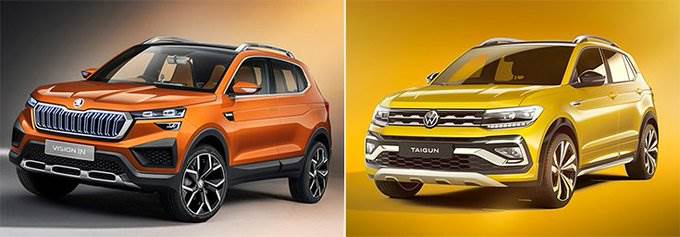by Sumantra B Barooah & Ujal Nair. 05 Feb 2020
At the recent unveil of the new Creta-rival midsize SUV concept, the Taigun, Volkswagen shared its strategy for its future in India and explains why it’ll move out of the lower part of the diesel vehicle market from April 1, 2020.
It’s not yet a significant player in India but Volkswagen is increasing its stakes in this market, which it feels has enough reasons to grow, despite the ongoing market challenges. In contrast, it is anything but bullish in the market of cars with relatively small diesel engines. Therefore, the German major has decided to discontinue the diesel variants of its Polo hatchback and the Vento sedan, which are powered by 1.5-litre diesel engines.
This is in contrast to the strategy of another global OEM, Hyundai Motor India, which is launching BS VI diesel compact cars. Even Tata Motors has launched its premium compact model Altroz with a diesel option.
Volkswagen feels it may not be a sustainable strategy, once the next stage of BS VI (BS6b) kicks in by 2023. “It will compulsorily require the SCR technology for the diesel, and because of such hi-tech diesel technologies, cost/price will shoot up dramatically and will not make business sense to incorporate it in the smaller vehicles,” says Steffen Knapp, director, Volkswagen India. Currently, around 35 percent of Volkswagen’s sales in India comes from the diesel market. For its Polo, the share has dropped to around 11 percent, from 65 percent five years ago.
In an emerging market like India where Volkswagen is part of a band of auto manufacturers that play in 30 percent of the market share, it says models like the Polo and Vento have shown an improvement in market performance over the past few quarters. Volkswagen is confident that with a stronger sales network, higher localisation level and improved manufacturing capacities it has a better chance of success under its India 2.0 business strategy.
Volkswagen is also strongly pitching for the hybridisation technology and electric mobility while keeping its portfolio or relatively large diesel vehicles open for Europe and India, the only two significant markets for diesel vehicles. It also believes that in the current stage of development, the fuel cell technology would be more viable for long-haul commercial vehicles.
Petrol power for VW Taigun and Skoda Vision IN
The new Taigun from Volkswagen and the Skoda Vision IN midsize (over 4.2 metres long) SUVs will both share 1-litre and 1.5-litre petrol engines. It has also been revealed that the company will have hatchbacks in its India 3.0 strategy. With the latest engines and with cars that are built of 95 percent galvanised steel, Volkswagen claims that it has tended for the latest and the upcoming emission and safety norms. It is investing in its manufacturing facilities in Pune and Aurangabad to further improve its export capacities from India.

Speaking at the launch of the new Taigun, Jurgen Stackmann, member of the board of management Volkswagen passenger cars for sales, marketing and after sales said, “I have been in Volkswagen for 10 years now and I was part of the Vento and the Polo and the key learnings from this market is that we need to be more deeply woven in the industry like Maruti Suzuki and Hyundai and this is why we are happy to give our keys to India to our sister company Skoda that is more pragmatic and faster and they go deeper in the learning. The key learning that we have got from here is that you need to adapt really deep in here to succeed.”
Betting hard for software
Volkswagen is also strongly pushing for embedded software solutions for the automotive sector with the acquisition of a software company in Stuttgart which already has 20 percent of its entities in India. Volkswagen has stated that India is the most rapidly growing part of its core business.
Volkswagen does the platform development for the rest of the brands and hence it would be the main carrier of the car software organisation. It has been revealed that the organisation would have around 6,000-7,000 engineers working on the automotive software stack, in India. It will be independent from the hardware and the actual car.
The software stack will be the software that the cars would use as per the need and at the same time allowing retrofitment in the cars of older generations. This global panel would tap into talents across the world and Volkswagen considers India as a key part of this development. It also sees India as the “most fascinating subcontinent on Earth”. Perhaps, one of the reasons why even after 20 years of trying to build a successful business, it’s raising its bets more with even more hope.
Also read: Volkswagen Group’s 2+2 approach to gain 5% market share in India
/news/volkswagen-india-to-pull-the-plug-on-diesel-polo-and-vento–focus-only-on-larger-diesels-55443 Volkswagen Vento, Volkswagen Vento Volkswagen shares its strategy for its future in India and explains why it’ll move out of the lower part of the diesel vehicle market from April 1, 2020. https://www.autocarpro.in/Utils/ImageResizer.ashx?n=http://img.haymarketsac.in/autocarpro/5e2d8881-7dc0-41c9-b33b-409bb4d65380.jpg
